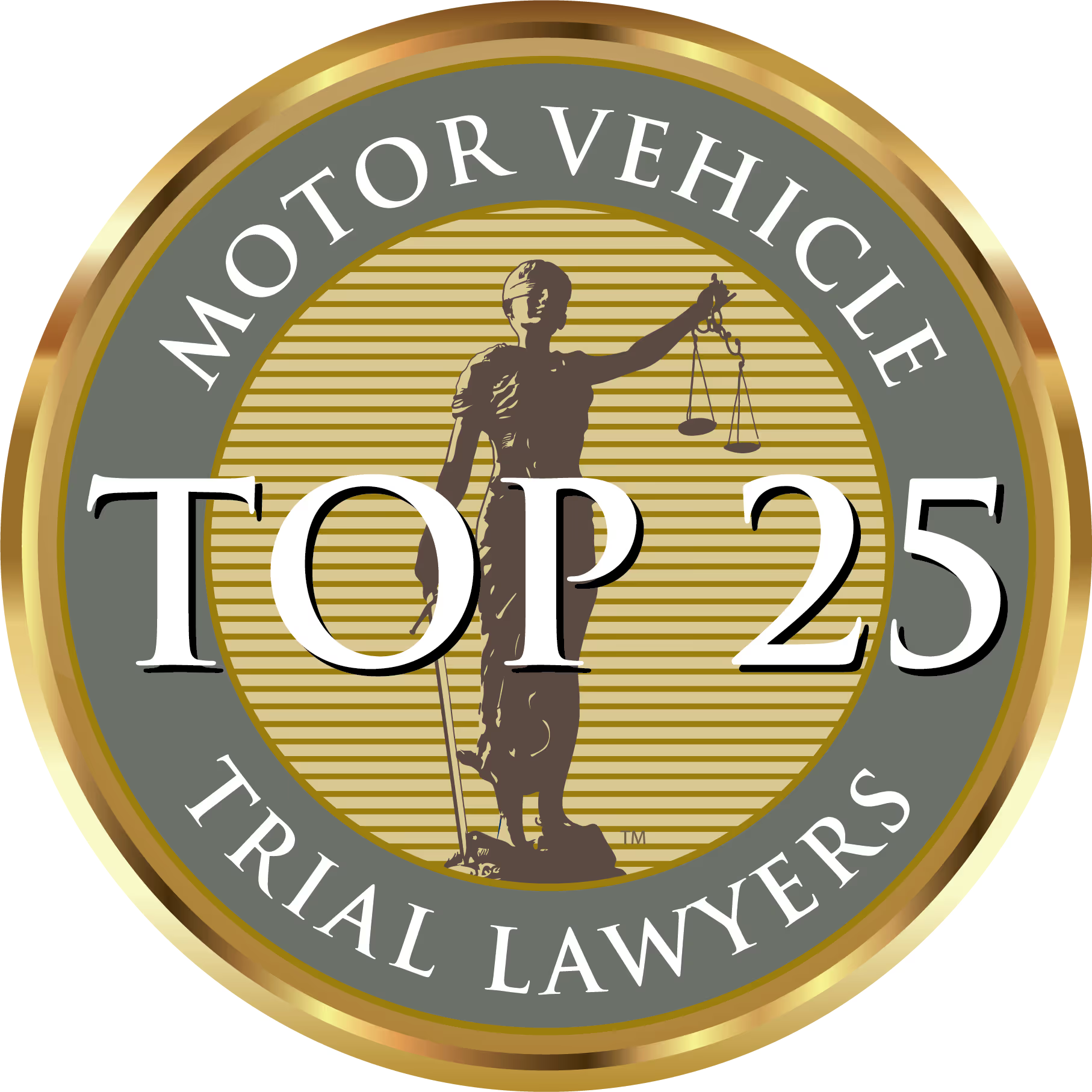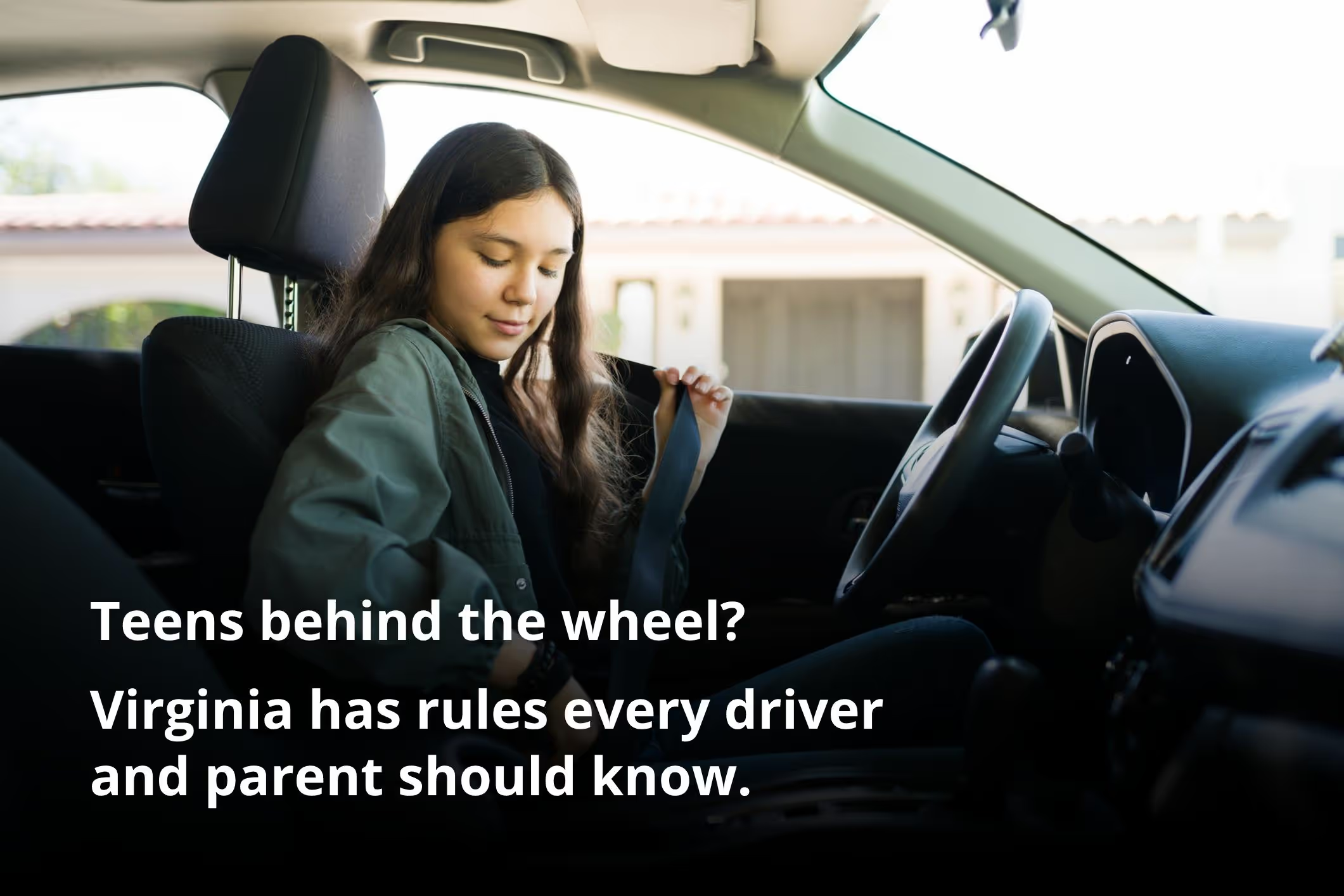Teenage Driving Laws in Virginia
Teenage Driving Laws in Virginia

.webp)

There's nothing quite like the freedom of getting behind the wheel for the first time. For many teens, a driver's license represents independence, confidence, and the beginning of adulthood.
But that freedom comes with serious responsibility.
Virginia's teen driving laws were designed to help protect new drivers as they build experience on the road. Whether you're a parent preparing a teen for their learner's permit or a 17-year-old wondering how close you are to full driving privileges, understanding these rules isn't optional—it's essential.
Let's break down Virginia teen driving laws, including permit restrictions, nighttime curfews, and the most common mistakes that lead to accidents or fines.
Injured in an accident caused by a teen driver? Call Smith Law Center at (757) 244-7000 or contact us online for experienced legal support after a crash.
Why Virginia Has Special Driving Laws for Teens
Drivers aged 15 to 19 are among the most at-risk groups on the road, not just in Virginia but nationwide. Inexperience, distractions (hello, cell phones), and peer pressure all contribute to higher crash rates for teen drivers.
To reduce those risks, Virginia has implemented a graduated licensing system. This means teens earn driving privileges in stages, gaining more freedom as they prove they can drive safely and follow the rules.
Understanding these teenage driving laws in Virginia can prevent costly mistakes and help keep you and everyone else on the road safe.
Learner's Permit: The First Step
Teens can apply for a learner's permit in Virginia once they turn 15 years and 6 months old. To qualify, they must pass a vision screening and a knowledge exam that covers traffic signs, laws, and safe driving practices.
Here's what to know about this initial phase:
- A licensed driver aged 21 or older (or 18+ for immediate family members) must ride in the front seat at all times.
- Drivers must log 45 hours of supervised driving, including 15 hours at night.
If this stage goes well, teens can move on to the next level—a provisional license.
Provisional License and Driving Restrictions for 17-Year-Olds in Virginia
Once a teen has held their learner's permit for at least nine months and completed driver's ed, they may qualify for a provisional license, also known as a driver's license with restrictions.
This is where Virginia teen driving laws get more specific. For example, the driving restrictions for 17-year-olds in Virginia (and anyone under 18) include:
- Passenger limits: For the first year, only one passenger under age 21 is allowed unless accompanied by a licensed adult. After one year, up to three under-21 passengers may ride along, but only under specific circumstances (such as driving to school-sponsored events).
- Cell phone ban: No phone use is allowed while driving, not even hands-free. This is stricter than the law for adult drivers.
- Seat belt requirements: Seatbelts are mandatory for everyone in the vehicle, and teens can be pulled over solely for a seatbelt violation.
Driving Curfew in Virginia: What Time Do Teens Have to Be Off the Road?
One of the most important (and often overlooked) rules is the driving curfew in Virginia.
Teens under 18 cannot drive between midnight and 4:00 AM, with a few exceptions:
- Traveling to or from work,
- Driving to a school event or activity,
- In an emergency situation, or
- With a licensed parent in the vehicle.
Violating the curfew can result in license suspension, delays in achieving full driving status, and potentially increased insurance premiums.
Not sure what your crash case involves? Smith Law Center reviews every detail, from curfew violations to license status, when helping clients injured in crashes involving teen drivers. Call (757) 244-7000 or reach out online for a free case review.
Common Mistakes That Put Teen Drivers at Risk
Virginia's teenage driving restrictions aren't there to punish teens—they exist to save lives. But even with these guardrails, many young drivers make preventable mistakes, such as:
- Driving friends around before they're legally allowed,
- Texting or using social media behind the wheel,
- Speeding or failing to adjust speed for rain or darkness,
- Driving tired after late-night practices or weekend events, and
- Ignoring curfew rules because "it's just a short drive."
Unfortunately, accidents involving teen drivers often follow these patterns. In our experience at Smith Law Center, we've seen how devastating one bad decision can be, even for responsible teens.
Consequences for Breaking Teen Driving Laws in Virginia
Breaking teen driving laws in Virginia can result in more than just a warning. Penalties may include:
- Fines and court fees,
- Mandatory driver improvement clinics,
- Points added to a teen's DMV record, and
- License suspension or revocation.
Insurance companies may also raise premiums or cancel policies after repeated violations. That's why teens and their parents must stay informed.
What Parents Can Do: Set the Standard Early
The rules are clear, but teens learn how to drive safely by watching the adults around them. If you're a parent, this means:
- Following speed limits and traffic signals every time,
- Putting your phone away while driving,
- Riding along during the first few months of solo driving, and
- Setting clear house rules that reinforce Virginia driving laws.
Even with all the proper precautions, accidents can still happen. That's when knowing your legal options matters.
Injured in a Crash Involving a Teenage Driver?
If you or a loved one were injured in a collision involving a teen driver, you may have a right to compensation, especially if laws were broken or supervision was lacking.
At Smith Law Center, we handle cases involving young drivers with care and professionalism. Our attorneys understand the complexities of teen driving laws and how they apply in the context of an insurance claim or lawsuit.
Whether you are the injured party or the parent of a teen driver facing serious consequences, we're here to help.
Call Smith Law Center for a Free Consultation
Need trusted legal advice about a crash involving a teen driver? Call (757) 244-7000 or contact us online today. Smith Law Center has been protecting Virginia families for decades, and we are ready to stand with yours.
Proudly Representing Virginia Residents
About Smith Law Center










